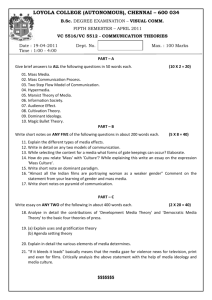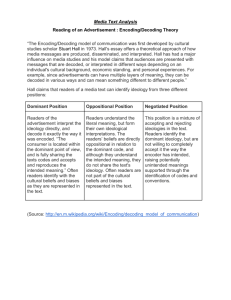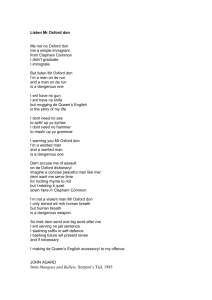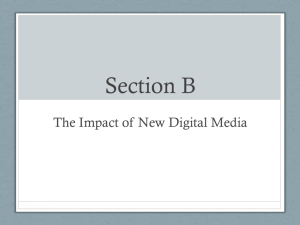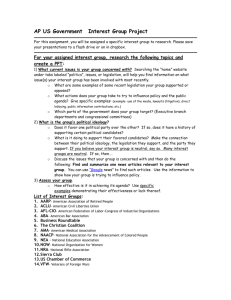The Essay
advertisement
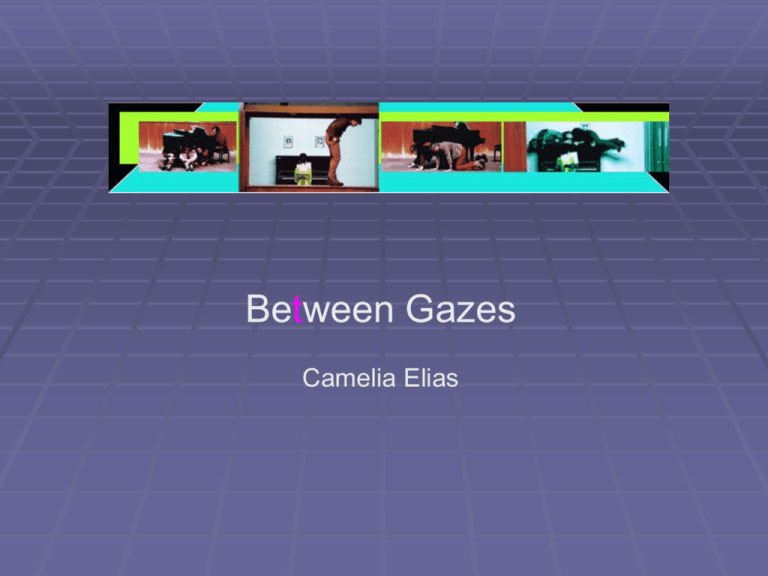
Between Gazes Camelia Elias Stuart Hall born in Jamaica, Kingston, 1932 studied at Oxford professor of sociology at the Open University, UK Race: the Floating Signifier Main claim Mass media are a means by which the ‘haves’ of society gain the willing support of the ‘have nots’ for the status quo. language in use (discourse) determines communicative events “the event must become a story before it can become a communicative event” (Encoding/Decoding, 164) “Culturalist” marxism Rejects rigid economic determinism Social behavior is overdetermined (has multiple causes such as class, gender, race) Marxist theorists tend to emphasize the role of the mass media in the reproduction of the status quo, in contrast to liberal pluralists who emphasize the role of the media in promoting freedom of speech. For Hall et al. the mass media do tend to reproduce interpretations which serve the interests of the ruling class, but they are also a field of ideological struggle (see D. Chandler: “Marxist Media Theory” http://www.aber.ac.uk/media/Documents/marxism/marxism11.html) hegemony Preponderant influence or domination of ‘haves’ over the ‘have nots’ Not total Not based on force Not a plot or conspiracy Based on widespread acceptance of dominant ideology ideology Mental frameworks or ‘codes’ widely used to understand society Mass media (esp. TV) usually encode (implicitly assume) the dominant ideology Encoding/Decoding the dominant ideology is typically inscribed as the preferred reading in a media text, but this is not automatically adopted by readers. The social situations of readers/viewers/listeners may lead them to adopt different stances. Dominant readings are produced by those whose social situation favors the preferred reading; negotiated readings are produced by those who inflect the preferred reading to take account of their social position; and oppositional readings are produced by those whose social position puts them into direct conflict with the preferred reading (see Hall’s essay: “Encoding/Decoding” and also D. Chandler: “Marxist Media Theory” http://www.aber.ac.uk/media/Documents/marxism/marxism11.html) Decoding options Three ways to decode media (text + sign) messages 1. operate inside the dominant code (fail to question the implicit dominant ideology) 2. apply a negotiable code (a version of the dominant ideology that reflects the audience member’s social position) 3. substitute an oppositional code (critical awareness, rejection of the dominant ideology) Cultural studies theory promotes oppositional decoding identity “Identity is the narrative, the stories which cultures tell themselves about who they are and where they came from” (S. Hall, “Negotiating Caribbean Identity”). “…identity is not only a story, a narrative which we tell ourselves about ourselves, it is stories which change with historical circumstances. And identity shifts with the way in which we think and hear them and experience them. Far from only coming from the still small point of truth inside us, identities actually come from outside, they are the way in which we are recognized and then come to step into the place of the recognitions which others give us. Without the others there is no self, there is no self-recognition” (Negotiating Caribbean Identity, 8). The European Encounter with the ‘Other’ (Americas, Africa, India) Western Clothed Fashion Labour Ethics Masculine Reason Culture The Other Naked Adornment Leisure Pleasure Feminine Emotion Nature Key points from Hall’s: “The West and the Rest” in Formations of Modernity, 1992 ‘West’ and ‘non-West’ are concepts with histories; they are not natural kinds The idea of the ‘West’ emerged because of contact with ‘non-West’; therefore these ideas also have geographies related to real places ‘West’ and ‘non-West’ are ideas that are part of discourses These geohistorical discourses inform our everyday thinking today “Listen Mr Oxford don” Me not no Oxford don me a simple immigrant from Clapham Common I didn't graduate I immigrate But listen Mr Oxford don I'm a man on de run and a man on de run is a dangerous one I ent have no gun I ent have no knife but mugging de Queen's English is the story of my life I dont need no axe to split/ up yu syntax I dont need no hammer to mash up yu grammar I warning you Mr Oxford don I'm a wanted man and a wanted man is a dangerous one Dem accuse me of assault on de Oxford dictionary/ imagin a concise peaceful man like me/ dem want me serve time for inciting rhyme to riot but I tekking it quiet down here in Clapham Common I'm not a violent man Mr Oxford don I only armed wit mih human breath but human breath is a dangerous weapon So mek dem send one big word after me I ent serving no jail sentence I slashing suffix in self-defence I bashing future wit present tense and if necessary I making de Queen's English accessory/to my offence John Agard cultural identity collective shared history among individuals affiliated by race or ethnicity is stable or fixed unstable, metamorphic, contradictory marked by multiple points of similarity and difference strongest in its hybrid mode East is East culture The signifying system through which a social order is: communicated reproduced experienced explored negotiated English Literature and Culture course insight into the diversity of ‘text and sign’ texts (novels, plays, poetry) mediated by visual representations that enhance the way text + sign as a concept circulates by way of diverse propagation text + sign dimension is best uncovered in a cultural text studies approach Culture is read as a text culture produces texts Texts are read as culture texts manifest culture
